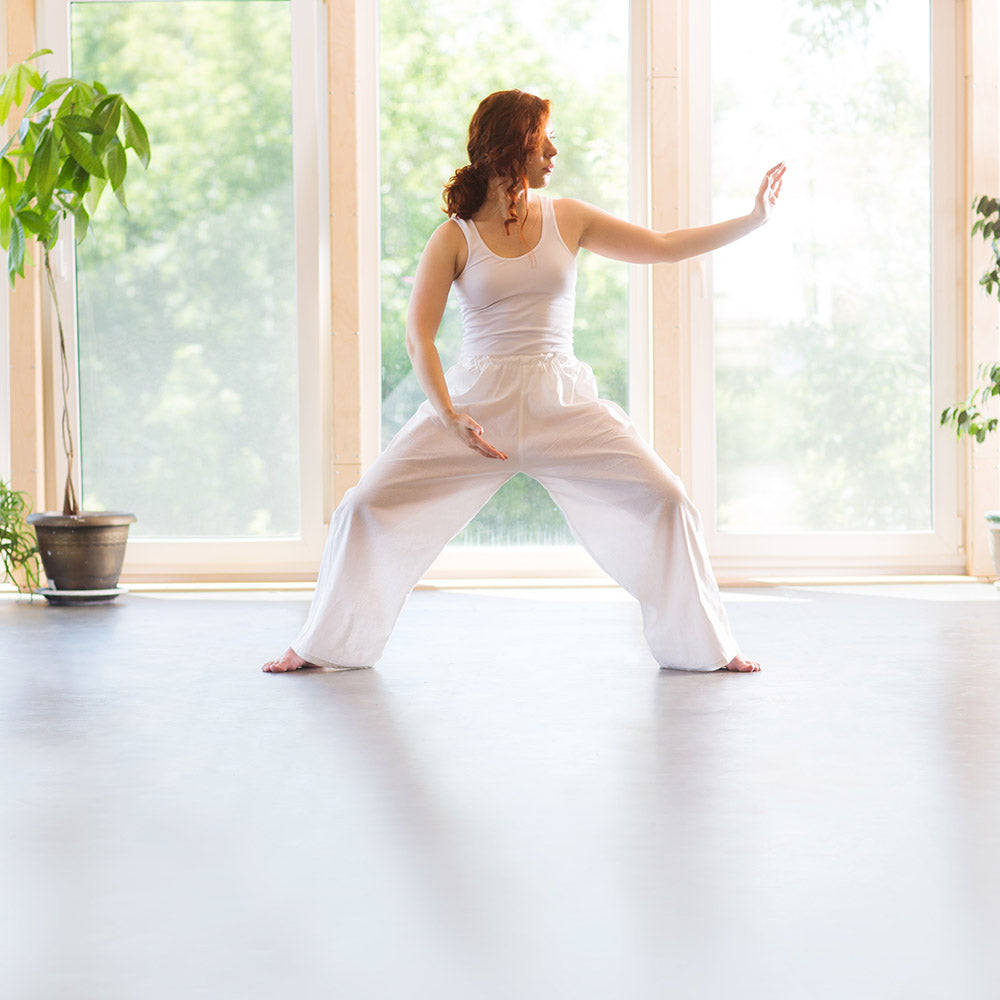How intentional was your day today?
Do you feel tense? Are you angry and don’t know why?
Cultivating and directing the energy inherent within us can be a vital tool for reducing stress in our busy day-in and day-out schedules.
When you coordinate your breath, intention, and physical movements throughout your day, you can find relaxing pockets of positivity wherever you are! That’s why I’d like to introduce you to qigong, explain some of the many qigong benefits and what you can do as a beginner to develop your life force and reduce anxiety.
What is Qigong?
Qigong (pronounced “chee-gong”) is an ancient Chinese health and wellness practice that combines controlled breathing, movement, and meditation to improve physical and mental health and stamina.
‘Qi’ can be translated to mean life energy, and ‘gong’ generally means work or cultivation of some act. So, ‘Qigong’ can be translated together to mean the cultivation of life energy.
Developed thousands of years ago, qigong is a practice that began within the Taoist religion/philosophy. It was created alongside other health and wellness practices and beliefs such as acupuncture, the yin-yang philosophy, and Chinese herbal medicine. Many people like to integrate all of these together in their health practices.
Don’t worry, though. No matter what religion you practice, qigong can be integrated without having to switch your faith!
You may be asking yourself: Is this the same thing as Tai Chi? The short answer is, no.
The difference between qigong and Tai Chi
Qigong is not a martial arts form. But, those studying Chinese martial arts may run across styles like Tai Chi where practicing one of the many qigong versions is encouraged for training. It strengthens posture, breath coordination, and helps harness and direct the energy force present in all of us.
The benefits of qigong
Whether you want spiritual enlightenment or just a gentle physical practice, qigong can be a comprehensive program with many health benefits.
Qigong mental benefits
Do you feel anxious a lot? Are you jumping from task to task with no clear focus?
Stress is common in today’s fast-paced world. That’s where qigong comes in to help. While regular physical activity can relieve stress, qigong helps you focus on the emotions behind the stress, giving you the power to work through the negativity and shake off the anxiety present in everyday life.
Qigong is known for both its meditation exercises and its ability to improve focus. One of the main goals of qigong is to develop mental acuity so that you are more aware of your internal state. Focus comes from learning to coordinate your breath and thoughts with the prescribed movements of qigong practice.
One study found that qigong could reduce symptoms of depression. The study found that those who practiced qigong also experienced less anxiety and better moods as compared to those who didn’t.
Qigong physical benefits
Typically, Western exercise focuses on flexibility and strength, whereas qigong uses relaxed movements to help fortify and control life force energy.
Yes, aerobics and strength training are good for your body. But focused, intentional relaxation and body awareness can also do wonders for your physical health.
In an interview for the Cleveland Clinic, integrative medicine specialist Yufang Lin, MD, states that “If qi becomes stagnant in a certain area, health problems can occur.”
Energy flow is what qigong is all about. Qigong uses simple poses and breathing patterns to promote a healthy flow and reduce the stagnation of qi. Proper flow of qi can help the body engage its own healing processes. The literal translation of qigong is “to work with qi.”
Do you sit at a desk all day? If you begin practicing qigong, you’ll start to notice how your energy levels balance out more consistently and discover the stretches that relieve the strain from sitting in an office chair all day.
Like yoga, qigong can be practiced using specific moves or postures that can work for general health or focus on a specific area of concern. So, if you are recovering from a lung or heart issue, there are qigong movements that can help push your chi, or life force, into the lungs or heart for healing.
Do you want more balance in your life? Qigong is perfect for increasing balancing. You’ll learn to avoid strain and pick up some tips on how to better protect yourself during a fall.
One main way chi flows through the body is through the nervous system. You’ll increase your awareness of the nerves throughout your body in order to learn how to direct chi where it can benefit you the most.
Qigong also helps strengthen martial arts skills and can push you to reach your other physical fitness goals.
How to get a qigong practice started
If you are just beginning, type in “qigong near me” into your favorite search engine to pull up a relevant list of qigong practitioners and teachers in your area. While qigong is a gentle type of exercise, it is still important to learn how to properly do qigong from experienced teachers to reduce your chances of injury.
But who has time for that?
Actually, if you can manage to just squeeze in 10 minutes a day, you can find the time to do qigong. You may find that you love the benefits you’re seeing from your qigong practice, and then you’ll find more time to make this a priority in your day.
Remember, you can always stop if you begin to experience discomfort or modify a move to reduce any forceful impact. And, be sure to check in with your doctor before you begin any physical exercise so you can make the best of your workouts and health practices.
Qigong spiritual benefits
No matter your religion, qigong can enable spiritual awakening or simply help one connect more with the spiritual and godly realm. One of the primary goals of qigong is to reach spiritual enlightenment or one with God.
The use of meditation and awareness not only increases your mental acuity, but it can also help you transcend the physical realm to follow your faith path and feel more in touch with the higher domain.
Christian, Taoist, Buddhist? Remember that, like many health and wellness practices, qigong is modular and can be adjusted to fit your lifestyle and faith.
Before you go, watch my conversation with Qigong certified practitioner Chris Shelton as he explains how qigong transformed his life as well as his students’ lives.
It’s pretty amazing to know that this ancient Chinese practice has survived all these centuries and is permeating Western cultures. And since it’s generally safe and easy for nearly anyone to try qigong, I hope you will try it for yourself. If you’re checking it out for the first time, whether it’s qigong meditation, qigong exercises, or spiritual qigong, I’d love to hear about your experiences so far!
XO,
Serena
by





